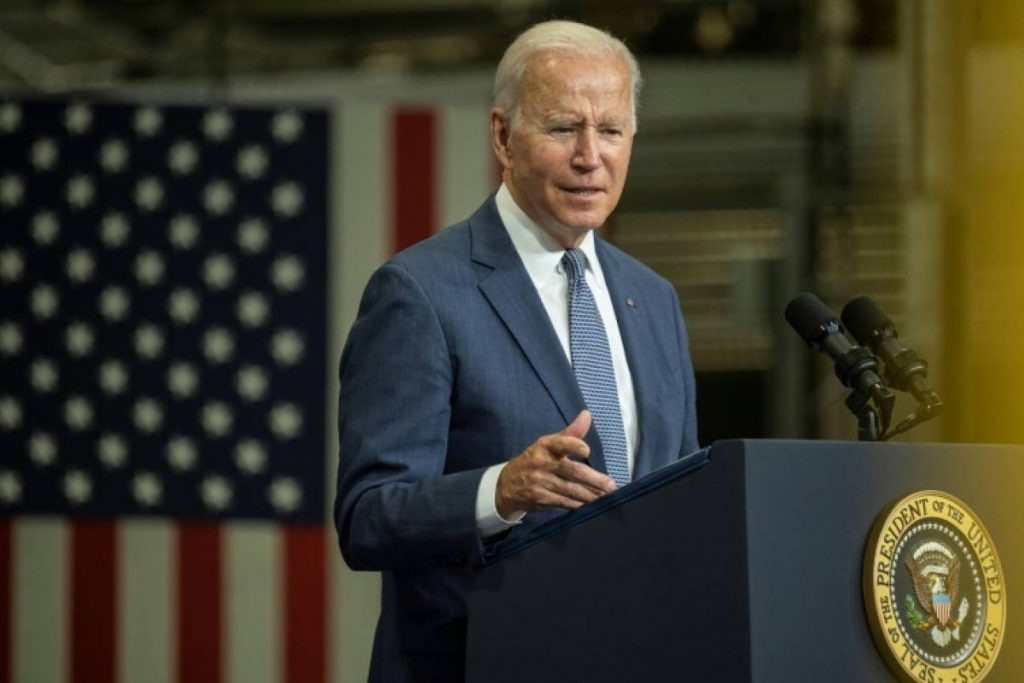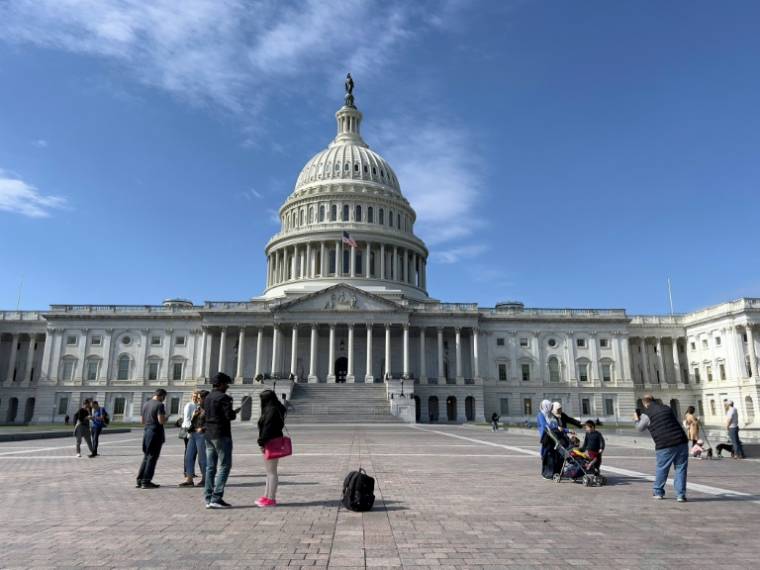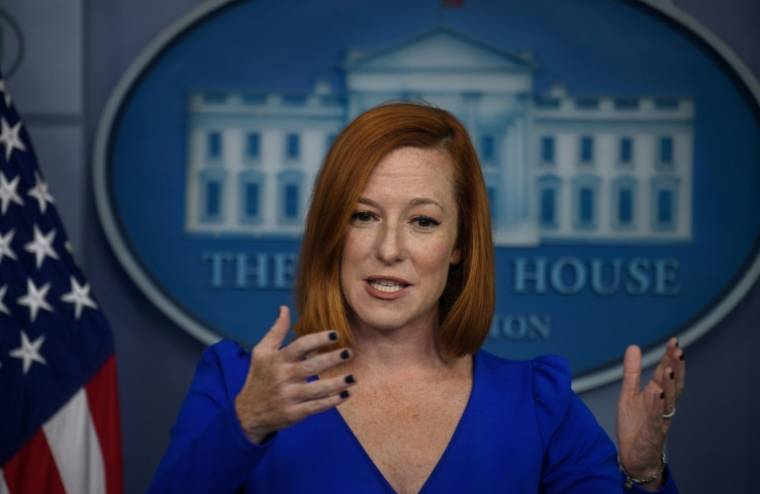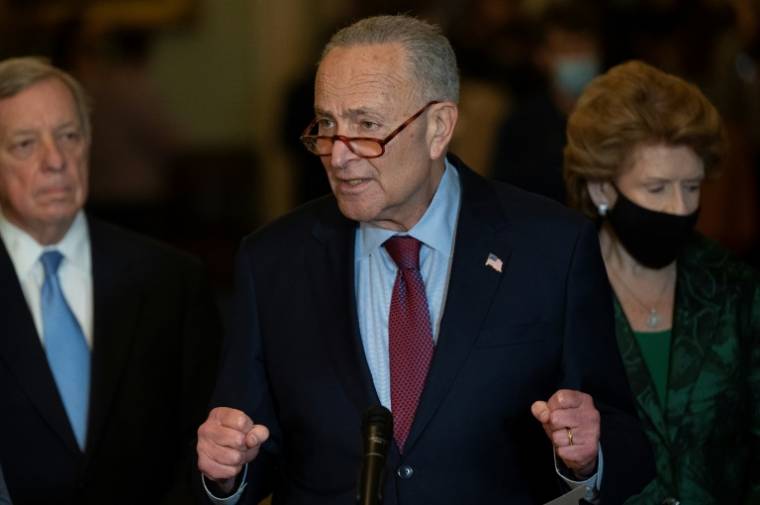
Feverish Congressional Race to Find a Deal on Biden’s Reforms Ahead of COP26

Joe Biden in Kearney, New Jersey, October 25, 2021 (AFP/Andrew Caballero-Reynolds)
The White House and US Democratic officials engaged in frantic negotiations on Wednesday to resolve lingering differences over Joe Biden’s massive social spending plan before the president travels to Europe.
And while the day began with the hope of a deal, the prospect of a consensus seemed remote early in the evening due to disagreements over how to fund 1,500 to 2,000 billion in social spending.
A key senator from the center has signaled his reluctance to plan a new tax on billionaires.
For her part, Democratic House Speaker Nancy Pelosi called for new discussions Thursday to advance Joe Biden’s agenda.
The US president would have agreed to new concessions Wednesday, such as forgoing sick leave, to try to get a deal before he left Thursday for Rome for the G20 summit, according to the Wall Street Journal.
Joe Biden hopes to present to his international partners, in Italy and in Glasgow for the COP26 climate conference, an image of a United States committed to energy transformation and growth but also to fighting social inequality and tax evasion.
“Kindergarten for Everyone. Historic climate investments. Lower healthcare costs. All within reach. Let’s get these bills across the finish line,” Joe Biden wrote on Twitter.
“We are very close” to an agreement, White House spokeswoman Jen Psaki said earlier.

The Capitol Building in Washington, October 24, 2021 (AFP/Daniel SLIM)
Democrats are working on two 8- to 10-year programs: one relating to investments worth $1.2 trillion to modernize infrastructure. The other relates to social and environmental measures of 1500 to 2000 billion.
Although planned, it would be “the largest investment in the history of the fight against the climate crisis by the United States,” said Jen Psaki.
– super riches –
But funding for these plans has been the subject of heated debate for months within the Democratic Party.
On Wednesday, the outlines of the tax on the super-rich were presented.
According to this new proposal by Democratic Senator Ron Wyden, Chairman of the US Senate Finance Committee, “the billionaire’s income tax will apply to about 700 taxpayers and raise hundreds of billions of dollars.”

Jane Psaki at the White House, October 27, 2021 (AFP/Nicolas Cam)
This would ensure that “the country’s richest people pay their fair share (to fund) historic investments in childcare, paid leave and combating the climate crisis,” she added.
The big news is that unrealized capital gains are being taxed, these idle gains in the thick portfolios of the stocks of the great American fortunes.
The text specifies that “the proposal will only cover taxpayers with annual income of more than $100 million or more than $1 billion in assets over three consecutive years.”
According to US media, the tax rate used will be 23.8%.
Today, a wealthy shareholder like Tesla boss Elon Musk, or Jeff Bezos, Amazon founder, doesn’t pay taxes on these unrealized capital gains arguing that those gains don’t exist as long as they aren’t actually spent.
– intermediaries –
But centrist Senator Joe Manchin has dampened hopes of passing the tax.
He replied, “I don’t like the idea that we target different people (…) who contribute to society and create a lot of jobs.”
However, his vote, like that of his colleague Kirsten Senema, is crucial because the Democratic majority in the Senate is so weak that the party must get all the votes without exception.

Chuck Schumer in Congress in Washington, October 26, 2021 (AFP/Jim WATSON)
However, he told reporters, Democrats should be “absolutely” able to secure the deal’s framework by the end of the day, political news site The Hill reported.
Kirsten Sinema, who opposes raising taxes, has not said if she intends to support this method of financing. On the other hand, it decided on Tuesday in favor of a minimum tax of 15% on multinational corporations.
She explained that she considers it a “logical step to ensure that highly profitable companies (…) pay reasonable minimum taxes on their profits.”
This minimum tax, which should affect about 200 companies including the tech sector, has already made a comeback after a text was introduced on Tuesday by several senators.
BR Gel DT / IPA

“Unapologetic pop culture trailblazer. Freelance troublemaker. Food guru. Alcohol fanatic. Gamer. Explorer. Thinker.”
